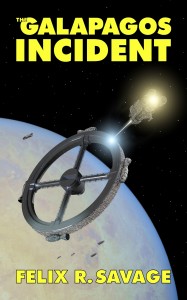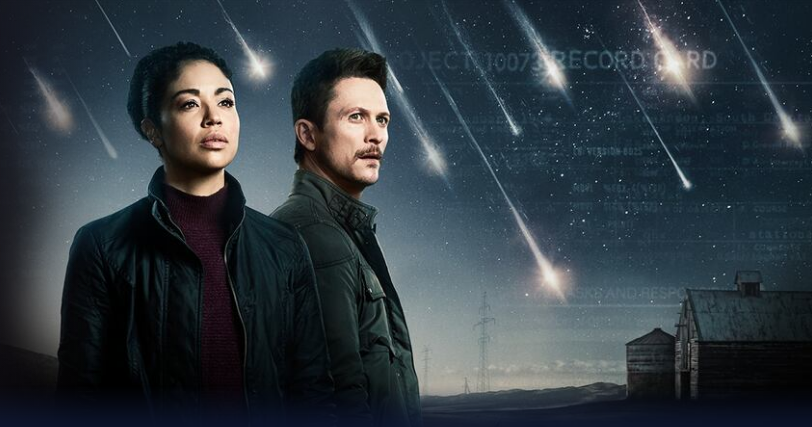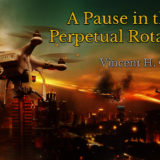 The Galapagos Incident
The Galapagos Incident
Chapter 31
“This is very, very exciting,” Cydney Blaisze said breathlessly. “We’re about to witness the third, count ‘em, the third attempt to rescue Botticelli Station! The first two attempts failed, but this time, the engineers in charge think they’ve cracked it!”
Elfrida stood in the Kharbage Can’s Cargo Bay No.2, with Cydney’s feed running in the corner of her left eye. The cargo bay was packed with EVA-suited figures, dry-gripped to the anchor plates like Elfrida, or floating on tethers in the middle of the bay. Everyone had come out to witness the third and hopefully final rescue attempt. They could have just watched the feed in the lounge, of course, but with the media hyping the event, they had all sheepishly found some excuse to spectate IRL. They thus became part of the event themselves. The big screen in Cydney Blaisze’s studio alternately showed Venus and the crowds in the Can’s cargo bays.
“As they say, third time lucky! Let’s find out if that’s true!”
Elfrida grumpily wondered how many other banal sayings Cydney could think of to fill the minutes. The woman’s sprightliness and relentlessly bubbly stream of chat got on her nerves. Elfrida hadn’t thought their first interview went very well. But Cydney had contacted her afterwards to effuse about what a wonderful guest she’d been, and to beg Elfrida to help her land a direct feed from the Can on the day of the rescue attempt. Elfrida now wished she hadn’t bothered.
“The first attempt, of course, used B-Station’s own auxiliary engines to try to boost the station into orbit …”
Stop calling it B-Station, Elfrida thought. You only think that makes you sound like an insider. She blinked to a different channel, and heard a male host blathering about “B-Station” over a view of helmeted heads. With a shock, Elfrida recognized the top of her own helmet. She resisted the urge to look up and see who was filming her, or had been a few minutes ago. Lots of her colleagues must have sold the feeds from their helmet cams to desperate curators. They had probably done that because they feared they would soon be out of a job.
“The second attempt” (Elfrida had grumpily blinked back to Cydney) “involved shooting projectiles at B-Station through a rail gun! Snerk! Is anyone surprised that didn’t work?”
“Oh, shut up,” said someone on the Can’s public channel who was also watching Cydney. “It would have worked if they hadn’t had to abort.”
“Now, for this third attempt, they’ve come up with a really fantarrific idea!” Cydney displayed vid, filmed this morning, of the Nagasaki shrinking into the distance. “That is the antique passenger ship that carried the colonists of 11073 Galapagos to safety. Now its job is done. The last of the colonists transshipped to the Kharbage Can this morning. Snerk! I bet it’s pretty crowded in there.”
“No fucking shit,” said the same person. Elfrida thought it was Lomax, one of the Superlifter pilots.
“Lomax, you OK down there?” someone else said.
“Yeah. We’ll be on target in a couple of minutes.”
The Superlifters were far below, zooming around the nightside of Venus. They were towing the Nagasaki on what would certainly be its final journey, regardless of whether it succeeded or failed.
“Space Force proposed towing B-Station to safety,” Cydney explained. “But Gravesfighters can’t operate in an atmosphere! Even if they could, they wouldn’t be able to slow down enough to attach the tow ropes. So they’re going to try something else.”
Someone was edging towards Elfrida through the crowd. Most of the trekkies wore their own spacesuits, personalized and accessorized with mobility packs, tool-belts, holsters, and the like. This person was in a standard pale blue UN suit, so it had to be one of her B-Station colleagues.
“Some people don’t know this, but back in the early days of spaceflight, they used to launch ships into orbit with rockets! There were no launch cannons, so they would balance the ship on top of a rocket booster and fire it into space.” Cydney had a model Space Shuttle on her desk. She fitted the pieces together, fired the Space Shuttle into the air, and ran across the studio after it, uttering her trademark giggle: snerk, snerk. Elfrida gritted her molars.
“I thought I’d find you out here. Smile.”
Elfrida looked away from dos Santos without responding. They had not spoken since their calamitous debrief. No one else had spoken to dos Santos since then, either. It was now common knowledge that she was going to swing as the scapegoat for the Cheap Trick affair. No one else knew that she had sacrificed her job to save Elfrida’s.
“They might pull it off this time, huh?”
Elfrida said, “I’m sorry. You probably know I’ve been avoiding you.”
“That’s all right. So has everyone else.”
“I just didn’t know what to say.” She realized now that she didn’t want to let dos Santos go. Self-indulgent or not, that was the way she felt.
“… and that’s how they’re going to boost B-Station back into orbit!” Cydney Blaisze flipped her hair and snerked.
“I wish she’d stop saying B-Station,” dos Santos said. “There’s nothing wrong with dumbing it down for a general audience, but don’t try to sound like an insider at the same time.”
“Oh, I know!” Elfrida said. “And what’s with randomly adding a ‘z’ to her name?”
“Hmm, I hadn’t thought about that. Personally, it’s the ‘snerk, snerk’ that annoys me.”
“Oh my dog, me too!”
“Smile. Good job not calling her out on it when you were stuck on the screen with her for two hours.”
“Oh, I wanted to. Smile.”
There was a silence, but the tension between them had eased. Dos Santos broke the silence. “Well, my marching orders have come through. I’m going to ship out on the Kiko with the rest of you guys. You’ll be heading back to Earth, and I’ve been ordered to UNLOESS. So we’ll be together for a while longer, anyway.”
But we were never together, Elfrida thought mournfully. And now it was too late. “What … what’s going to happen at UNLOESS? Do you know?”
“Oh, it won’t be that bad. I’ll have to grovel, of course, and say all the correct things. But at the end of the day I’ll be a free woman. Smile. I can hardly wait.”
Elfrida realized that dos Santos was putting a brave face on it, but she also felt a prickle of irrational envy. Dos Santos made getting fired sound like an adventure.
“What will you do afterwards?”
“That, I haven’t thought about yet. It all depends on this.” Dos Santos gestured towards Venus. “If they salvage the station, well … we talked about that before. There will be consequences.”
Muted exclamations came over the public channel, but there was still nothing to see except the smouldering nightside of Venus. Somewhere down in that chthonic atmosphere, the Superlifters were slowly towing the Nagasaki towards Botticelli Station. Just like B-Station, the ancient passenger ship was full of air. It had sufficient buoyancy to stay aloft in Venus’s clouds.
And it also had a fusion drive that could, the techies calculated, produce maybe fifteen seconds of acceleration before it exploded.
The idea, as Cydney Blaisze had explained, was to use the Nagasaki as the equivalent of a rocket booster of olden days.
If it successfully boosted Botticelli Station back into orbit, 25 billion human beings would cheer. And dos Santos would not ‘just’ get fired. Once the evidence was recovered, she would face a jail sentence for hacking and attempted theft.
“Yeah,” dos Santos said. “So it’s … I don’t know. I can’t root for them to fail. But I also can’t hope they succeed. By the way, have you seen Lomax’s feed? That’s what everyone is looking at.”
Elfrida hadn’t. She searched the Can’s feeds until she found the one from Lomax’s Superlifter. She gasped. Huge and ugly, the naked torus of Botticelli Station wallowed in the clouds, lit by glancing beams of light from the Superlifters.
The station had been gradually losing altitude all this time. A couple of sols ago it had crossed the tropopause into the troposphere, where the winds were weaker but the familiar devils of heat and pressure came into play. Now it drifted a mere 34 kilometres above the surface—so low that if this were Earth, the engineers on the station would be able to see individual buildings. But here, all they could see was superheated murk. They were working in hazard-resistant suits borrowed from Space Force, in temperatures of around 180° Celsius. Under those hellish conditions, they had achieved a miracle.
The Nagasaki had been maneuvered underneath Botticelli Station and speared its needle-prow through the torus, like a dolphin catching a ring on its nose. The station now perched askew on top of what had been the cathedral’s domed roof.
“Is anything holding it on?” Elfrida wondered aloud.
“Nuts and bolts,” someone said.
“All right,” Lomax said. “We’ve taken everyone off, except for that bearded madman. We are now running away like little girls.”
“Girls can run faster than that,” shouted someone who sounded like Petruzzelli.
“We’re being careful,” Lomax said.
The conjoined vessels sank away into the clouds, like sea creatures sinking back into the depths. In reality, Elfrida knew, they were not sinking. The Superlifters were retreating into space as fast as they could trudge.
“No one’s ever fired up a fusion drive in six bars of mostly carbon dioxide before,” Lomax remarked. “The whole dang atmosphere might go up. Who knows?”
Light bloomed deep in the clouds.
“Here we go,” Lomax said.
It was like watching an asteroid impact in reverse. Instead of vanishing, the flash grew whiter, brighter, bigger. Lomax’s feed, in one corner of Elfrida’s vision, seemed to foreshadow the expansion of the pinpoint star she could see with her naked eye.
Shouts erupted all over the public channel. “Oh my dog! The whole amosphere is going up!”
“Well, that’s one way to destroy evidence,” dos Santos murmured on their private frequency. She sounded as if she were smiling.
“The oxygen’s burning,” Elfrida groaned. “Six bars of carbon dioxide? Not even half! They forgot to figure in what the Project has already done to the atmosphere! Our green slime produces oxygen, and because oxygen is lighter than CO2, it’s all risen into the troposphere. And now it’s burning. Our oxygen!”
Now easily visible without filters, the spot of fire on the nightside of Venus flickered blue and green around the edges.
“And methane!” Elfrida moaned. She wanted to kill someone.
“Yeah,” dos Santos said. “Major facepalm moment.”
A familiar, long-unheard voice cut across the babble on the public channel. “Yee-haaaa! Vee have escape velocity!”
Captain Sikorsky—in the words of Lomax, ‘that bearded madman’—was on the bridge of Botticelli Station, piloting the station on its wild ride towards space. He had lobbied successfully for the job because no one else wanted it.
“Now firing explosive charges,” Sikorsky screamed. “Nagasaki ees jettisoned! Do svidaniya!”
Out of the inferno spreading across the nightside, Botticelli Station came flying like a frisbee. It hurtled into orbit and coasted to an altitude appropriate for its momentum.
The Nagasaki followed, flaming like a comet. For a moment it appeared as if the ancient passenger ship, too, would escape Venus’s gravity well. Then it exploded.
“The attempt has now been launched,” Cydney Blaisze informed the solar system, seated in front of a traffic meter that showed her audience growing by millions of people per second. “We’ll know very soon whether it succeeded or failed. But whatever the outcome, we’ll know one thing beyond a doubt: Venus matters so much to these brave men and women that some of them are prepared to die for humanity’s future on the White Planet. The United Nations Venus Remediation Project will live on as a testament to their dedication and courage, a symbol of the pioneering human spirit.”
“It’s all about politics,” Elfrida said. “Remember what that awful talking head, Cydney Blaisze, said about UNVRP? It’s a testament of hope and a symbol of the human spirit, blah blah blah. That’s why they’re not closing us down.”
“I could have told you that a long time ago,” Captain Okoli said. “UNVRP’s always been politically motivated. It sure ain’t economically motivated.”
“All right, but now it’s even more so. If they shut us down, it would look like the PLAN was winning.”
They stood in the spacious vestibule of the Kiko, a.k.a. the quad-module barge Kharbage In, Kharbage Out. The ship had arrived from the far side of the Belt to evacuate the last of the Galapajin, along with the Botticelli Station survivors. They would first swing out to the Belt to drop the Galapajin off on Ceres. Then they would return to Earth. The whole journey was projected to take about three months, owing to an upcoming conjunction with Mars, which necessitated a wide detour.
“Maybe the PLAN are winning,” muttered Lomax. His face was bubble-gum pink. Badly burned when his Superlifter caught on fire, he had had to have skin transplants over 40% of his body.
Elfrida said, “No, they’re not.” She tried to think of something to add to that, but couldn’t.
The conflagration in Venus’s troposphere had disappointed the schadenfreude crowd by burning itself out, as the planet’s turbulent Hadley circulation diluted the oxygen with non-flammable CO2. Only about 10% of the oxygen excreted by UNVRP’s green slime had been consumed. That set the biogenic phase of the Project back by several years, but it was hardly a fatal obstacle, in the face of the political determination since exhibited by the General Assembly and the President herself. The successful recovery of Botticelli Station had struck the opening note of a system-wide chorus of self-congratulation. Now politicians and pundits were lining up to pay tribute to the Project.
And to the casualties. To the roster of B-Station personnel killed in the PLAN attack, was now appended the name of Toshio Hirayanagi. The old priest had died on the Nagasaki. Someone had had to be there to throw the switch, and he had volunteered.
“Anyway, you’re sticking with the Project?” Okoli asked Elfrida. The question was casually posed, but it silenced the little group. Everyone’s attention turned to her.
“Yeah. Guess I am.“ She had thought about it long and hard, but had not known the answer herself until now. As soon as the words were out, she knew that she’d made the right decision. She felt lighter, relieved of a burden of doubt.
Okoli cracked a grin. “Well, if you ever change your mind, you know you’ll always have a home on the Can.”
“Yeah, absolutely,” Petruzzelli said. “It would be great to have someone else on board with the same size feet.”
“The same size feet?” Elfrida echoed. “Alicia, that’s so random.”
“I’m just a random trekkie.”
Elfrida chuckled, a lump in her throat. “Well, I really appreciate it, guys. I mean it. Anyway, I expect we’ll be working together again. I don’t know if I’ll be posted back to B-Station, but if not, I’ll probably end up somewhere in the Belt.”
“Bet you won’t be working with another stross-class phavatar anytime soon,” Okoli said.
Elfrida knew he was probing for information. Blandly, she said, “Probably not. The stross-class has been recalled. There were a few problems with its on-board assistant.”
“It was a bit too smart for its own good, huh?”
“Actually, depending on who you talk to, the problem may have been that it wasn’t smart enough.” Elfrida herself disagreed with this diagnosis. Even the dumbest human would have known not to send out unencrypted data about an asteroid full of purebloods. What Yumiko had lacked was not smarts, but common sense—the same problem that had doomed the first generation of AIs. It was terrifying, but also kind of awesome, to think that the R&D guys were still trying to fix it, never admitting defeat.
Of course, neither would they admit that their product had leaked data to the PLAN, albeit unintentionally. So a cloud still hung over Kharbage LLC’s public image. That had to rankle. But on the other hand, UNVRP lived, and so did Kharbage LLC’s contract with the Project. So Okoli should be happy, right? He was going to keep on making money. That was what the private sector cared about.
And that, Elfrida thought, was why she had to stick with the UN, flawed as it was. At least they had bigger goals than turning a profit. They were trying—and failing, and trying again—to build a happier, more secure future for humanity.
“I’d better go,” she said, shifting her hold-all into her other hand. “I want to see what kind of cabins they’ve got on this truck.”
“Yeah,” Okoli said. “I’m gonna have a chat with Captain Wallace, and then we’ll be on our way, too.”
“Seeya,” Petruzzelli said, waving.
As the Kiko accelerated out of Venus orbit, Elfrida joined the people in the first-class passenger lounge who had come together to watch the screen, drawn by an inchoate urge for companionship. Venus receded, an impervious globe. The bodies of Jun Yonezawa and Father Hirayanagi were somewhere out there, too, dancing around the planet amid the wreckage of humanity’s latest attempt to conquer it.
“I’ll be back,” Elfrida whispered. “I promise..”
****
The Kiko accelerated constantly to the midpoint of its journey and then decelerated the rest of the way to Ceres, a brachistochrone trajectory that would get them there faster than a burn-and-coast. This meant that in addition to the spin gravity within the hab modules, the passengers and crew experienced a constant 0.1 gees of thrust gravity. The Kiko’s hab modules hinged down on gimbals when the ship was under thrust, aligning their floors with the resultant of the acceleration vector and the centrifugal gee-vector. This was nice, but it limited travel between the modules. Elfrida had ended up in first class, while dos Santos was stuck in cattle class with the Galapajin, a concrete reminder of her loss of status. Thus, Elfrida didn’t see her former boss during the journey.
On their arrival at Ceres, Elfrida immediately went across to the third-class module to look for dos Santos. They were only scheduled to be here for two hours, which was just long enough to offload the Galapajin if everyone walked fast. She stumbled into a highly coordinated debarking operation cunningly disguised as chaos. It should have been easy to spot dos Santos among the small, frail, black-haired Galapajin, but Elfrida couldn’t see her anywhere.
She took the shuttle down to Sheikh Al-Hasimi Spaceport. The spaceport was a vast, graphene-shelled starfish, much bruited as an architectural landmark, on the surface of the asteroid. Parking bays lined both sides of each arm. Elfrida squeezed into one of the bubble-trams carrying the Galapajin to the immigration center, which was like an immigration center anywhere. Tubular conveyor belts funneled people towards giant scanners. “Have you seen dos Santos?” she asked the Kiko personnel who were handling the Galapajin’s paperwork. The Ceres immigration officials stared.
“Who?” said the Kiko’s purser.
“Gloria dos Santos. My—the UNVRP manager who was travelling in third class.”
“Oh, her. She’s going back Earthside with us, last I heard. She’s not here, anyway.”
Elfrida went back to the Kiko. She searched the third-class module from top to bottom. She asked everyone when they had last seen dos Santos. Even Captain Wallace got involved in the search. But dos Santos was nowhere on the ship. Elfrida’s first instinct had been right. Somehow, dos Santos had managed to get off the Kiko without being spotted. She was gone.
To read the other chapters of THE GALAPAGOS INCIDENT, click here.










